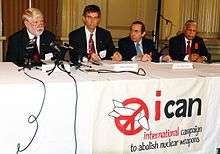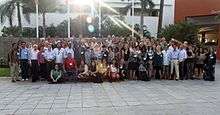International Campaign to Abolish Nuclear Weapons
| Founded | 2007 in Melbourne, Australia |
|---|---|
| Type | Non-profit international campaign |
| Headquarters | Geneva, Switzerland |
| Field | Nuclear disarmament |
| Website |
www |
The International Campaign to Abolish Nuclear Weapons (abbreviated to ICAN; pronounced /ˈaɪkæn/ EYE-kan) is a coalition of non-governmental organizations in around 100 countries advocating the negotiation of a nuclear-weapon-ban treaty.
The campaign has worked to reframe public and diplomatic debates on nuclear weapons to place the focus on their humanitarian and environmental impacts, rather than abstract notions of deterrence and strategic stability.
Formation

In September 2006, the Nobel Peace Prize-winning International Physicians for the Prevention of Nuclear War adopted a proposal at its biennial congress in Helsinki, Finland, to launch ICAN globally.[1] The first launch took place on 23 April 2007 in Melbourne, Australia, where funds had been raised to establish the campaign.
Founders of ICAN were inspired by the success of the International Campaign to Ban Landmines, which was pivotal in bringing about the negotiation of the anti-personnel mine ban treaty in 1997. They sought to establish a similar campaign model.[2]
The Mayors for Peace network, led by the mayor of Hiroshima, became one of ICAN's first coalition partners. Other early partners were the Women's International League for Peace and Freedom, the World Federation of United Nations Associations and the Nobel Women's Initiative.
Milestones

At a five-yearly review conference of the Non-Proliferation Treaty (NPT) in 2010, ICAN urged governments to support the negotiation of a treaty to prohibit and eliminate nuclear weapons. While a majority of nations voiced their support for this objective, the nuclear-armed states would not accept it as an agreed pathway forward.[3]
However, the NPT review conference that year did express "deep concern at the catastrophic humanitarian consequences of any use of nuclear weapons",[4] providing ICAN and supportive governments an opening to pursue what became known as the Humanitarian Initiative.
This initiative consisted of a series of international statements and three major intergovernmental conferences – in Norway in 2013 and in Mexico and Austria in 2014 – to examine the "humanitarian impact of nuclear weapons".[5] ICAN served as the civil society coordinator for each conference.
Throughout 2015, ICAN garnered global support for a diplomatic pledge, known as the Humanitarian Pledge,[6] committing nations to cooperate in efforts "to fill the legal gap" in the international regime governing nuclear weapons.[7] Initiated by Austria, the pledge attracted the support of 127 nations.[8]
Building on this foundation, ICAN then campaigned for the establishment of a UN working group to examine legal measures and norms for achieving a world without nuclear weapons.[9] It met in Geneva in February, May and August 2016, and recommended the negotiation of a nuclear-weapon-ban treaty.[10]
The First Committee of the UN General Assembly then adopted a resolution in October 2016 to negotiate "a legally binding instrument to prohibit nuclear weapons" in 2017.[11] ICAN hailed this decision as "a major step forward, marking a fundamental shift in the way that the world tackles this paramount threat".[12]
Supporters

A number of prominent individuals have lent their support to the campaign, including Nobel Peace Prize laureates Desmond Tutu, the Dalai Lama and Jody Williams, the musician Herbie Hancock, the cricketer Ian Chappell, the actors Martin Sheen and Michael Douglas, and the artist Yoko Ono.
In November 2012, the Secretary-General of the United Nations, Ban Ki-moon, praised ICAN and its partners "for working with such commitment and creativity in pursuit of our shared goal of a nuclear-weapon-free world".[13] Earlier, he had provided a video message to ICAN in support of its global day of action.[14]
Structure
ICAN is a coalition consisting of several hundred partner organizations, and has no individual membership. An international steering group and staff team coordinate the campaign's activities.[15] Its main offices are in Geneva, Switzerland, and Melbourne, Australia. It has a number of national campaign coordinators.
ICAN organizes global days of action, holds public awareness-raising events, and engages in advocacy at the United Nations and in national parliaments. It works with survivors of the atomic bombings of Hiroshima and Nagasaki, as well as nuclear test survivors, to help amplify their voices.[16]
See also
References
- ↑ Campaign milestones 2006] ICAN website
- ↑ "The International Campaign to Abolish Nuclear Weapons", Ronald McCoy, 30 April 2016
- ↑ Towards Nuclear Abolition, ICAN report, 2010
- ↑ Final Document, NPT Review Conference, May 2010
- ↑ Humanitarian Impact of Nuclear Weapons, Reaching Critical Will
- ↑ Humanitarian Pledge, initiated 9 December 2014
- ↑ Filling the Legal Gap, Article 36 and Reaching Critical Will, April 2015
- ↑ Support for the Pledge, Austrian government, 7 April 2016
- ↑ Taking Forward Multilateral Nuclear Disarmament Negotiations, UN Open-ended Working Group, 2016
- ↑ Majority of UN members declare intention to negotiate ban on nuclear weapons in 2017, ICAN press release, 19 August 2016
- ↑ UN resolution L.41, adopted 27 October 2016
- ↑ UN votes to outlaw nuclear weapons in 2017, ICAN press release, 27 October 2016
- ↑ Letter from the UN Secretary-General, sent to ICAN, 2 November 2012
- ↑ Ban Ki-moon's message to ICAN, June 2010
- ↑ Structure and people, ICAN website
- ↑ Hear the stories, ICAN website

